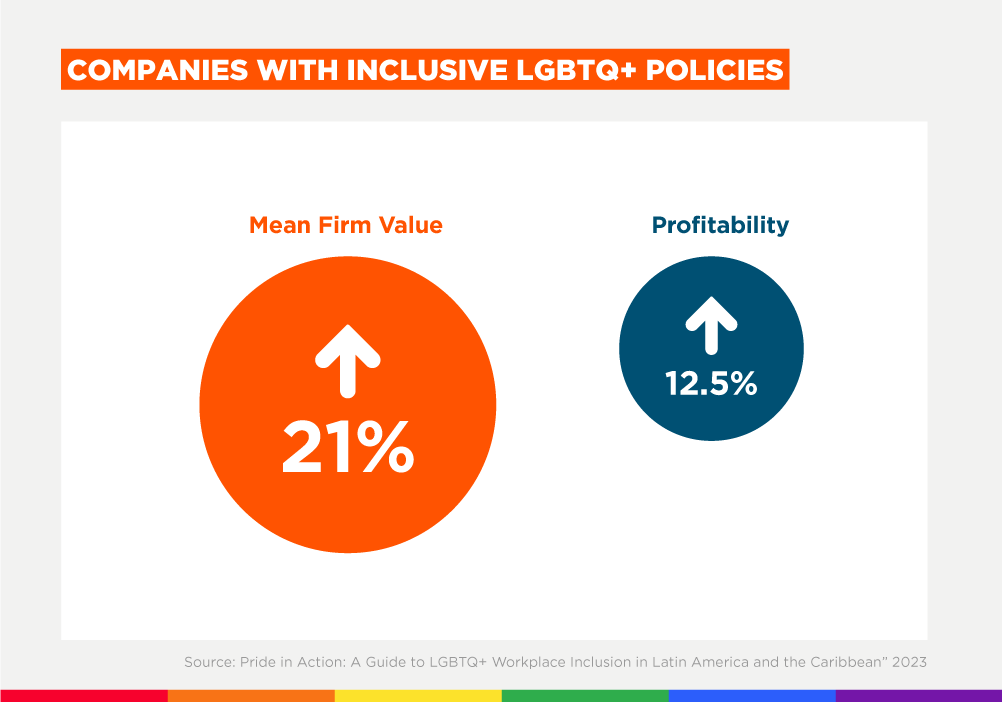LGBTQ+ Inclusion in the Workplace: A Business Imperative for Latin American and the Caribbean

Talent retention, increased productivity, employee satisfaction, operative wellbeing, and business growth are characteristics of an inclusive workplace environment where employees thrive and make companies more competitive, productive, sustainable, attractive, and lasting. A dream for any CEO, business owner, or entrepreneur.
To make this dream come true, the inclusion of the LGBTQ+ community is imperative.
According to a recent IDB Invest study, “Pride in Action: A Guide to LGBTQ+ Workplace Inclusion in Latin America and the Caribbean”, the LGBTQ+ community represents between 5 and 6 percent of the world’s population, which amounts to between 33 and 39 million people in Latin America and the Caribbean.
The study also finds that positive attitudinal changes toward this community are happening quickly. Younger generations are more accepting, and businesses are already working with and providing goods and services to the most openly gender and sexually diverse population in the region’s history, whether they are aware of it or not.
As a result, it is important for companies to find ways to attract, retain, and promote LGBTQ+ talent so they can design products that meet their specific needs and preferences and take advantage of their diverse points of views.
According to the study, research from the United States “directly captures the impact of inclusive policies for LGBTQ+ people on firm-wide outcomes, showing higher firm value, employee productivity, and overall profitability.” Comparing companies with inclusive policies for LGBTQ+ and those that do not have them, the mean firm value increased as much as 21% and profitability was raised by 12.5%. The study suggests that, although this data does not yet exist in the LAC region, similar results are to be expected.
To improve conditions, retain talent, and have a positive impact on productivity processes, the study suggests a list of recommendations that companies can adopt to start or continue the promotion of LGBTQ+ inclusion.
These involve basic steps like recognition initiatives to more specific structural changes like setting up gender-neutral bathrooms and a complete framework to assess commitments, implement actions, measure progress, and communicate results.

“Achieving true workplace inclusion requires a collective effort from businesses, policymakers, and society at large to challenge existing biases and norms that hinder the full acceptance and empowerment of LGBTQ+ people,” the report adds.
As the study points out, the region has shown consistent -- even if uneven -- improvements in the legal recognition of LGBTQ+ people, and positive changes in attitudes. Moreover, a growing body of research has consistently shown the economic benefits of diversity and inclusion in general, and specifically on the business impact of LGBTQ+ inclusion.
Our countries still have to overcome deep challenges and obstacles that prevent society‘s recognition and acceptance of all forms of gender and identity expressions.
We need to make collective efforts to achieve full affirmation and empowerment of the LGBTQ+ community by fostering organizational values of understanding, respect, and equal opportunity, so we can have a future where all employees, regardless of their sexual orientation or gender identity and expression, feel valued, supported, and are able to thrive in their professional lives.
Applying the tools and recommendations stated in the study, we are taking another step towards a more productive, inclusive and diverse society.
To see the complete and detailed table with more information and considerations click here.
LIKE WHAT YOU JUST READ?
Subscribe to our mailing list to stay informed on the latest IDB Invest news, blog posts, upcoming events, and to learn more about specific areas of interest.
Subscribe



